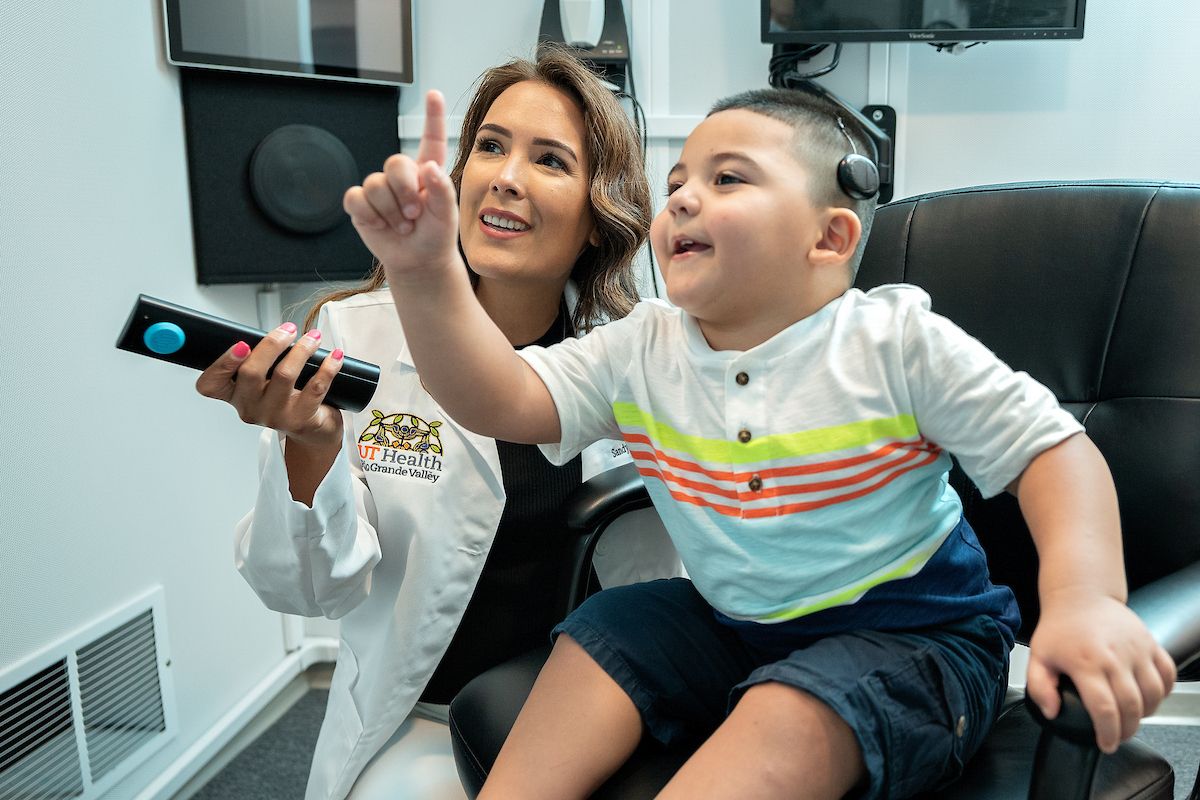Welcome to the Department of Communication Disorders
Mission Statement
It is the mission of the Department of Communication Disorders to enrich the lives of the people of the Rio Grande Valley, State of Texas, United States, and internationally by preparing professionals who are highly competent, compassionate, and ethical service providers equipped to work collaboratively with educational, health, medical, and social science disciplines; who conduct transformative research to enrich the lives of persons with disorders of communication; and who value meaningful engagement with the communities they serve.
Vision Statement
The Department of Communication Disorders seeks to become a premiere program that strives towards empowering and engaging students of diverse backgrounds through exceptional and innovative academic and clinical preparation, transformative research and dedicated investment in regional and global communities.
Accreditation Statement
The Master of Science (M.S.) education program (residential) in speech-language pathology at The University of Texas Rio Grande Valley is accredited by the Council on Academic Accreditation in Audiology and Speech-Language Pathology of the American Speech-Language-Hearing Association, 2200 Research Boulevard, #310, Rockville, MD 20850, 800-498-2071 or 301-296-5700.
What are Communication Disorders?
Two professions comprise the field of communication disorders: Audiology and Speech-language Pathology. Audiologists provide diagnostic hearing and balance evaluations and aural rehabilitation services. Speech-language Pathologists (also known as Speech Pathologists or Speech Therapists) work with people who have impairments of speech, language, and swallowing by diagnosing and remediating these disorders. Speech disorders may include problems with the proper pronunciation of certain speech sounds, voice and resonance disorders (such as vocal nodules or laryngectomy), and fluency disorders (such as stuttering). Language disorders can occur in children and adults. In children, language disorders may express themselves in the presence or absence of other disorders such as developmental disabilities or intellectual impairment. In adults, language and swallowing problems most likely result from a stroke or a progressive, degenerative neurological disorder such as amyotrophic lateral sclerosis (ALS, or Lou Gehrig’s disease). Clients or patients represent the entire age range from birth to the elderly and come from a wide variety of racial, ethnic and cultural backgrounds. Many employment positions are in public schools and medical settings, but opportunities also exist in community agencies, free standing clinics and private practice.
Please note: The Department of Communication Disorders currently does not offer a Doctor of Audiology (Au.D.) program. Until the Au.D. program is established within our department, students desiring to become audiologists must either complete the audiology area of concentration for the baccalaureate degree in Communication Sciences and Disorders at UTRGV and then transfer to a university that offers an audiology program, or enroll from the outset at a university that has a professional doctoral program in audiology.
Academic Programs
Bachelor's
American Sign Language and Interpretation (BS)
Bachelor of Science in American Sign Language and Interpretation
Program Modality: Campus
The Bachelor's degree in American Sign Language and Interpretation (ASLI) provides students with the essential skills to become proficient, confident, and professional ASLI practitioners. The ASLI degree equips entry-level practitioners with the knowledge and skills to become effective ASL communicators. Upon completion, graduates of the program will be eligible for state and national ASL Interpreter certification and/or specialized state certification in tri-lingual Interpretation.
Concentrations:
Communication Sciences and Disorders (BS)
Bachelor of Science in Communication Sciences and Disorders
Program Modality: Campus
The Bachelor’s degree in Communication Sciences and Disorders prepares students to provide skills to individuals with communication disorders. After graduation, students will be eligible to apply to graduate school in the fields of speech-language pathology, audiology, or a related field. Graduates of the program are eligible to apply for licensure to practice in the State of Texas as a Speech-Language Pathologist Assistant.
In the Communication Sciences and Disorders program, graduates are equipped with the knowledge and skills to make a difference in people’s lives through the prevention, assessment, and treatment of communicative disorders. A degree in communication sciences and disorders offers opportunities to assist individuals and communities in various healthcare settings.
Master's
Communication Sciences and Disorders (MS)
Master of Science in Communication Sciences and Disorders
Program Modality: Campus
The Master’s degree in Communication Sciences and Disorders provides students with the advanced knowledge and skills to become effective speech-language pathologists. The program equips students with the skills to effectively assist in the prevention, assessment, and treatment of communication disorders to improve the lives of patients.




